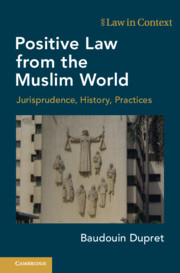Book contents
- Positive Law from the Muslim World
- The Law in Context Series
- Positive Law from the Muslim World
- Copyright page
- Dedication
- Contents
- Acknowledgments
- Introduction: Law Properly So Called, from an Islamic Vantage Point
- Part I The Concept of Law
- Part II Historical Ontologies
- 4 Politics Made into Law: Determinism and Contingency in Moroccan Constitutionalism
- 5 The Legal Reification of the Mind: The Development of Forensic Psychiatry in Egyptian Law and Justice
- 6 From ‘Urf to Qânûn ‘Urfî: The Legal Positivization of Customs
- Part III Legal Praxeologies
- Conclusion: A Praxeological Approach to Positive Law
- Notes
- Bibliography
- Index
5 - The Legal Reification of the Mind: The Development of Forensic Psychiatry in Egyptian Law and Justice
from Part II - Historical Ontologies
Published online by Cambridge University Press: 16 June 2021
- Positive Law from the Muslim World
- The Law in Context Series
- Positive Law from the Muslim World
- Copyright page
- Dedication
- Contents
- Acknowledgments
- Introduction: Law Properly So Called, from an Islamic Vantage Point
- Part I The Concept of Law
- Part II Historical Ontologies
- 4 Politics Made into Law: Determinism and Contingency in Moroccan Constitutionalism
- 5 The Legal Reification of the Mind: The Development of Forensic Psychiatry in Egyptian Law and Justice
- 6 From ‘Urf to Qânûn ‘Urfî: The Legal Positivization of Customs
- Part III Legal Praxeologies
- Conclusion: A Praxeological Approach to Positive Law
- Notes
- Bibliography
- Index
Summary
Legal transformations in Egypt reflected the impact, through circuitous channels, of both civil law and modern scientific ways of thinking. What Egypt was undergoing in the legal domain can best be characterized by what we call the “positivization” of law and science. This holds true for the sciences of the mind and, consequently, forensic psychiatry. The very science of psychiatry, and its corollary pathologies and the kinds of patient concerned, was invented in the nineteenth century, when the mind was transformed into an object of knowledge. Egypt participated in the movement that saw the invention of psychiatry and therefore created psychiatric hospitals, specialized personnel, specific vocabulary, and scientifically relevant categories into which people suffering from “mental illness” could be placed. This dynamic had an impact on law and justice. This chapter partly follows this transformation of the understanding of the mind through the words and concepts used by Egyptian courts, from the late nineteenth to the mid-twentieth century, to characterize mental states and to attach legal consequences to them.
- Type
- Chapter
- Information
- Positive Law from the Muslim WorldJurisprudence, History, Practices, pp. 132 - 153Publisher: Cambridge University PressPrint publication year: 2021

